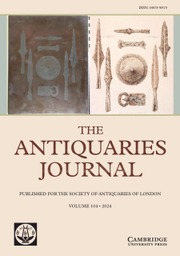Article contents
On the Statue of King Charles at Charing Cross
Published online by Cambridge University Press: 21 April 2011
Extract
Newly discovered evidence, here printed, from the proceedings in an equity suit in the Exchequer shows that le Sueur's statue of Charles I was indeed buried underground in the Interregnum, and illuminates the circumstances of the burial. This fills a lacuna in the documentary history of the statue.
- Type
- Research Article
- Information
- Copyright
- Copyright © The Society of Antiquaries of London 1987
References
Notes
1 Chamberlayne, Edward, The Second Part of the Present State of England, 12th edn. (London, 1684), 303.Google Scholar This passage is not in the IIth edn. (London, 1682).
2 Stow, John, A Survey of the Cities of London and Westminster, ed. Strype, John (London, 1720), vi, 77Google Scholar.
3 Venue Note Books, 1, Walpole Soc. xviii (1930), 90Google Scholar; see also ibid., 122 and Venue Note Books, vi, Walpole Soc. xxx (1955), 59, 60Google Scholar.
4 Walpole, Horace, Anecdotes of Painting in England, 3 vols. (Strawberry Hill, 1762-1763), II, 135–6Google Scholar.
5 Survey of London, xvi (London, 1935), 265, 268Google Scholar; ibid., xxxvi (London, 1970), 125.
6 [von, J. W.] Archenholz, A Picture of England, 2 vols. (London, 1789), 11, 151–2Google Scholar.
7 [Smith, Horatio], Brambletye House; or Cavaliers and Roundheads. A Novel, 2nd edn. 3 vols. (London, 1826), 1, 28–9Google Scholar; Manchee, W. H., ‘Huguenot London: Charing Cross and St. Martin's Lane’, Proc. Huguenot Soc. London, xii (1917-1923), 350Google Scholar(sceptical of the actual burial); Denoon, D. G., ‘The Statue of King Charles I at Charing Cross’, Trans. London & Middlesex Arch. Soc. new ser. vi (1933), 466.Google Scholar The story has recently been repeated in Weinreb, B. and Hibbert, C. (eds.), The London Encyclopaedia (London, 1983), 815Google Scholar.
8 Survey of London, xxxvi, op. cit. (note 5), 125–6.Google Scholar For the history of the statue in general, see Survey of London, xvi, op. cit. (note 5), 263–8;Google ScholarDenoon, , op. cit. (note 7), 460–86Google Scholar.
9 Stat. 12 Chas. II cap. 11, esp. ss. x, xvi, xxx, xxxi, xxxiii, xxxiv: Statues of the Realm, v, 226-34, esp. 228-9, 231-2.
10 For procedure in equity suits see ‘Sir T. F.’, The Practice of the Exchequer Court (London, 1658), 136–60Google Scholar; Fowler, D. B., The Practice of the Court of Exchequer, 2 vols. (London, 1795)Google Scholar(for answers, see esp. I, 412).
11 The proceedings are listed as a separate class in a list of c. 1730, Public Record Office [hereafter P.R.O.] OBS 1522; they are now in E 113, while other equity proceedings are in E 112, though some proceedings, including Revet's answer, have become separated from those in E 113 and added to the miscellaneous bundles in E 112. The contemporary means of reference are the Bill Books; those for this period are IND 16828-9.
12 For an example of an information with a long schedule (for Yorkshire), see P.R.O. E 112/564/221.
13 P.R.O. E 112/563/56. Cf. also the case of Henry Francis, who ‘never bought or had in his custody… any of the hangings or any other vtensills belonginge to the late kinge Queene or Prince or any the children of the late Queene as in a schedule to the said Informacion annexed is most vntruly alledged’: E 113/10 London, Middlesex.
14 cf. P.R.O. E 178/6588-9.
15 P.R.O. SP 23/162, pp. 439 and 441; this reference is misprinted in Survey of London, xxxvi, op. cit. (note 5), 126, 338.
16 P.R.O. SP 25/76, p. 212: Cal. State Pap. Dom. 1655, 265.
17 [Kennett, W.], A Register and Chronicle (London, 1728), 1, 150Google Scholar.
18 Vertue Note Books, I, op. cit. (note 3), 127Google Scholar.
19 Parthey 1435.v: Pennington, R., A descriptive catalogue of the etched work of Wenceslaus Hollar 1607-1677 (Cambridge, 1982), 248Google Scholar; Vertue Note Books, vi, op. cit. (note 3), 60Google Scholar.
20 Survey of London, xvi, op. cit. (note 5), 264.
21 P.R.O. E 112/564/292; printed by permission of the Controller of Her Majesty's Stationery Office. Original spelling and capitalization have been retained and abbreviations extended.
22 ‘time appointed by any’ would be better sense, but there is not enough space in the MS.
23 May be extended, as in P.R.O. E 112/563/56: ‘… any other matter or thing in the said bill con-teyned materiall or effectuall for this defendant to make answer vnto & not herein before sufficiently Answered vnto traversd confessed or denyed is true to this defendants knowledge All which matters & thinges this defendant shall bee ready to Aver Justifie mainteyn & proue as this Court shall Award and humbly prayes to bee hence dismissed.’
24 Counsel for the defendant.
25 Cursitor Baron of the Exchequer: see Foss, E., A Biographical Dictionary of the Judges of England (London, 1870), 402Google Scholar.
- 1
- Cited by


